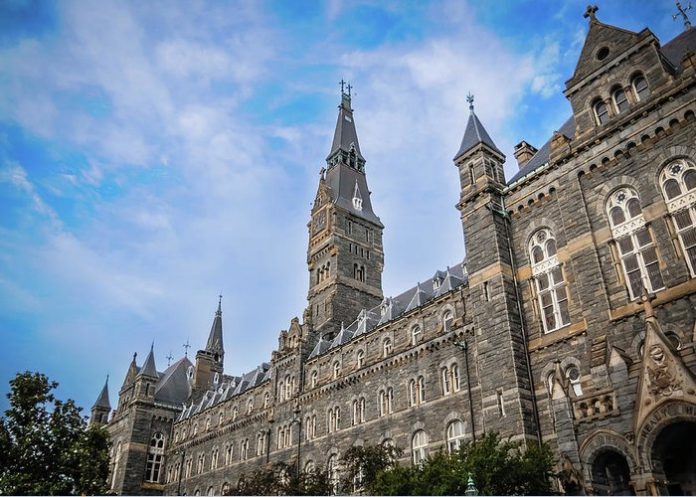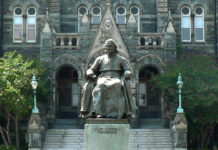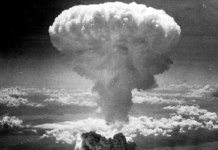![]()
The current Editorial Board of The Georgetown Review (presiding since October 27, 2019) supports full access to past articles published under different Editorial Boards, but does not necessarily endorse their content.
What is it that makes Georgetown great? Is it beautiful buildings, and the fact that our campus is often deemed to be a real-life Hogwarts? Or perhaps it’s our 2 billion dollar endowment? Or maybe it’s the age, as one of the oldest schools in the country?
In this piece, I will argue that Georgetown is the greatest university in the world, but I believe that none of these things are the reason why.
Buildings are just a physical creation of man, and thus they are temporary. Over time they will crumble and new ones will take their place. The endowment is a flawed monetary measurement of the school’s ability to fundraise, and it’s worth considering that for the vast majority of the school’s history, the Jesuits didn’t even have a serious fundraising model which could have allowed for the creation of an endowment. And our age, while worthwhile, is just a number.
In fact, President Coleman Nevills even tried to fudge our founding date, claiming instead of 1789 that the true founding of Georgetown occurred at the moment the Jesuits held their first mass in America on the Southern shore of Maryland in 1634. That date even sits over the front door of the White Gravenor building. Now, if you’re keeping track of the numbers here, you might have taken note that Harvard, “the oldest school in the country” was founded in 1636. So Fr. Nevills would have conveniently bumped Georgetown up in the chronological order of schools.
However, even if you accept that Georgetown was founded in 1634, it would still pale in comparison to many other of the world’s more ancient Universities, and my claims of Georgetown’s greatness do not stand limited by the extent of American boundaries on the Atlantic or Pacific.
I do think, though, that Fr. Nevills may have been onto something when he suggested that Georgetown was founded in the first mass. In this way, I believe that he wanted to make the argument that the essence of Georgetown was more importantly traced to an idea rather than a physical establishment date.
Before going further, it seems sensible to offer some guidelines for how I believe we should evaluate the greatness of a University. We could perhaps debate for some time the purpose of a University, but for the sake of time, I propose we accept this definition: a University is a very specific type of institution, with an important goal: namely, the fostering of a space in which individuals can form themselves as they rigorously pursue and attempt to understand the capital “t” truths of the world.
In 1872, Cardinal John Henry Newman, whom Pope Francis announced in February would soon be deemed a saint, gave a set of lectures which would later be published collectively as “The Idea of a University”. Newman suggests that a university offers individuals the opportunity to study as an ends in and of itself. While there, one is meant to learn for the inherent value of learning.
In a 2010 piece, Sophia Deboick of the Guardian effectively summarized Newman by stating that he “gives rise to a possible definition of the soul of the university – nothing geographically or temporally fixed, but the mark left on the alumnus’s mind, which stays with them all their lives. In reminding us that the university has a greater role than just doling out qualifications – that of shaping the whole individual.”
Today, universities around the world seek many different ends, to promote the best possible individuals in emerging technology, to craft future titans of business, to shape future spiritual leaders. However, the core purpose of a University, or at least of one dedicated to the liberal arts, ought to be considered the formation of the individual as he or she learns simply for the sake of pursuing the truths that exist in life. This is the core mission that Georgetown has retained, and this is where we find the success which propels us beyond other universities.
Georgetown uniquely pursues and promotes itself as not just an institution for higher learning, but a Catholic institution which builds off of a spiritual identity in order to raise the difficult questions of life. While many other schools offer the question of “how” to students, Georgetown also offers the question of “why”. The self-reflective nature of the school is not something to take for granted, and few do. I believe that Georgetown has a unique mission, and in proclaiming this mission, we attract people who are especially qualified to go forth and set the world on fire, just as St. Ignatius of Loyola tasked us with doing.
There’s a reason that Georgetown has the largest student-run business in the world, and the largest student-run credit union, and the first student-run emergency services system. There’s a reason our organizations such as the Philodemic Society, Gives, Blue and Gray, and our Campus Ministry faith groups have been looked to as models around the country.
What I’m trying to say is that there’s something special in the water at Georgetown.
What makes Georgetown unique is its belief in a capital “t” truth that is worth pursuing. When we are at our best, our university encourages all students to engage in the formation of self. We are guided by a five hundred year old mission meant to make us better people, more worthy of serving those around us. Our values are more than just banners that hang on lamp posts and blow in the wind, they are the bedrock foundation upon which all that we have done and will do is built.
I believe society has pushed a broken metric for analyzing the success of individuals and institutions. Too often, we allow our opinions to be dictated by broken Forbes and Business Insider ranking systems, which do little more than tally available statistics. What we should actually value are the intangible factors both in people and organizations. We should analyze missions and seek to understand purposes. Twenty years from now, our first memories of the Hilltop are unlikely to be the size of the endowment at the time or the fact that the rats were the size of dogs. No, when our kids ask us about Georgetown, our stories will focus around the lessons that we learned and the people that we learned them with.
Georgetown is by no means perfect, we have our flaws. The mold seems to keep on spreading, one can’t live under the roof of VilB without the fear of everything collapsing, and our basketball team has been known to cause mass heart problems throughout February and March each year. But, at the end of the day, we are so much more than the things which get cynically posted about in the Georgetown meme group. If we don’t understand what makes us special, then all we’ll ever be is a second-rate Harvard on the Potomac, but in knowing our mission, and preserving it, we find what and who makes us great.
There’s an old Native American term for the Potomac: Cohonguroton. For many years, just before graduation, something called the Cohongurotan Address would be given by a student. In 1957, Antonin Scalia gave the speech, and closed by noting that: “The hour is late now, and it is time for us to rise and go our separate ways. The fires around which we have sat these past four years will no more warm us. But they will not go out. Others come to take our places here, to learn as we have done, to hear the ancient wisdom of our tribe, to join its hunt. We go out into life, and leave all this behind. The camp stays ever fixed, like the river Cohonguroton, while we, like his waters, pass through to the sea.”
Indeed, this is what I claim makes Georgetown special. We are a place defined by a mission, and a special type of people choose to come and join the campfire, as Scalia suggests. Those people do amazing things on the Hilltop, but their work does not end there. Georgetown is not just a place people come to, but a place they go forth from. It’s a university which each one of us will forever hold in our hearts in a unique way.
It is the idea of Georgetown, the idea that there is a greater truth in the world which lies beyond the small political and social issues of the moment. Georgetown is eternal in this regard, and will outlive other institutions that will rise and fall over time. In a world that is increasingly governed by the whims of the moment, be it through social media or the public opinion of the mobs that do nothing but criticize, so long as we live above the fray and operate with our mission in mind, we shall be the greatest university in the world.
As I count my final moments at this incredible institution, amidst the goodbyes to old friends and the submission of final papers, I’ve tried to occasionally take some time to sit out by Healy Hall and just take it all in. In those brief moments, the world seems so calm, and the tulips seem to smell better than ever. As you push along in your time at Georgetown, rushing between classes and board meetings, job interviews and brunches, take the chance to look around campus, gaze at Healy Hall with all the awe and wonder of your freshman self, and recall that you are at the greatest university in the world.












